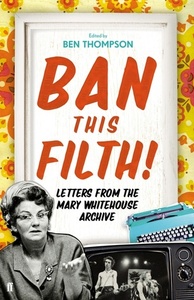Take a photo of a barcode or cover
My first interaction with the name Mary Whitehouse was an interview with her on TV just before her death in 2001. My Nan was babysitting me and proceeded to tell me how much she admired Mary Whitehouse for getting all the ‘filth’ off television. In the decade that followed I was aware of her name mainly through the light mocking of her on various comedy shows and documentaries. By the time I got to university and I was studying Post-War British culture, where Whitehouse always seemed to lurk in the background, my mind was pretty much made up. Conservative privileged lady terrified of the changing times. When my boyfriend bought me this book for my birthday ("it had you written all over it") I thought it was time for a re-evaluation of The Whitehouse.
For the first part of this book I did find myself warming to Mary more than I have done in the past. When I put myself in her shoes, circa. 1950s, it must have been genuinely terrifying that the new medium of television was changing the cultural landscape. It brought to mind a scene in The Krays where, after Mrs Kray is bought a new set by her delightful twin boys, the neighbours come round to marvel at this tiny box as if a spaceship had just landed in her living room. While her tone is sometimes over the top you have to admire her intentions and her gift for letter writing that would blow the average YouTube troll’s mind. The second half the book, however, digs deeper into her more objectionable aspects of character. Her political, religious and homophobic viewpoints muddy the waters of her cause somewhat as thinly veiled social engineering. As any good comedian knows you should always punch upwards, not downwards. So reading Whitehouse’s glee at successfully getting “Gay News” prosecuted under obscenity laws jarred with me. A product of the times or not she saw fit to target an oppressed minority and the rare outlet that they had in the media that (much as Mary would beg to differ) largely ignored them.
All that to one side, Ben Thompson makes a great revisionist case for Whitehouse. I particularly liked the parallels he drew between Mary and the Punk movement as being “two apples from the same tree”. Thompson is clearly enamoured with his subject but by no means shies away from her flaws. What could be just a dry book full of letters is turned into something witty and engaging. He is a writer who has his own distinctive voice, I was only a couple of pages in when I realised that I have read one of his previous books Sunshine on Putty a few years back. I highly recommend.
For the first part of this book I did find myself warming to Mary more than I have done in the past. When I put myself in her shoes, circa. 1950s, it must have been genuinely terrifying that the new medium of television was changing the cultural landscape. It brought to mind a scene in The Krays where, after Mrs Kray is bought a new set by her delightful twin boys, the neighbours come round to marvel at this tiny box as if a spaceship had just landed in her living room. While her tone is sometimes over the top you have to admire her intentions and her gift for letter writing that would blow the average YouTube troll’s mind. The second half the book, however, digs deeper into her more objectionable aspects of character. Her political, religious and homophobic viewpoints muddy the waters of her cause somewhat as thinly veiled social engineering. As any good comedian knows you should always punch upwards, not downwards. So reading Whitehouse’s glee at successfully getting “Gay News” prosecuted under obscenity laws jarred with me. A product of the times or not she saw fit to target an oppressed minority and the rare outlet that they had in the media that (much as Mary would beg to differ) largely ignored them.
All that to one side, Ben Thompson makes a great revisionist case for Whitehouse. I particularly liked the parallels he drew between Mary and the Punk movement as being “two apples from the same tree”. Thompson is clearly enamoured with his subject but by no means shies away from her flaws. What could be just a dry book full of letters is turned into something witty and engaging. He is a writer who has his own distinctive voice, I was only a couple of pages in when I realised that I have read one of his previous books Sunshine on Putty a few years back. I highly recommend.

